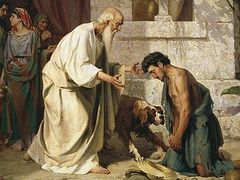St. Luke 5:11-32
 The relationship between parents and their adult children can be difficult, especially when young people assert their independence for the first time. Though it is not always the case, tensions often seem strongest between parents and children of the same sex; that is, between fathers and sons and between mothers and daughters. Perhaps that is because they often have so much in common and see themselves in one another.
The relationship between parents and their adult children can be difficult, especially when young people assert their independence for the first time. Though it is not always the case, tensions often seem strongest between parents and children of the same sex; that is, between fathers and sons and between mothers and daughters. Perhaps that is because they often have so much in common and see themselves in one another.
The parable of the Prodigal Son focuses precisely on such a relationship. A young man asked his father for his share of the inheritance, which the father gave him. The son’s request amounted to telling his father he wished he were dead so that he could inherit his share of the estate. The old man meant nothing more to him than a source of cash to fund a decadent lifestyle in a foreign land. The young man did his best to end their relationship and apparently had no intention of ever returning home. He treated his father so shamefully that we would expect neither of them to want to have anything to do with the other ever again. Members of families become estranged to this day over much less.
When the money ran out, the son found himself living in a time of famine in a strange land where the best job he could find was feeding pigs. He was so hungry that he envied the pigs their food. Given the Jewish context of the parable, this detail shows that he had fallen to the most miserable state imaginable. That is when he “came to himself” and realized that even his father’s hired hands had more than enough to eat. He resolved, “I will arise and go to my father, and I will say to him, ‘Father, I have sinned against heaven and before you; I am no longer worthy to be called your son; treat me as one of your hired servants.”’ The son had learned his lesson the hard way and saw the gravity of what he had done. He had broken his relationship with his father beyond any repair he could imagine. The most he could hope for would be to return as a mere servant.
The father, however, was not concerned at all about what the son deserved for his actions. He must have looked out into the distance every day with the unlikely hope that his son would eventually come home. That is when he saw the prodigal still a long way off “and had compassion, and ran and embraced him and kissed him.” That was a shocking response, both to the son and to anyone else who happened to see it. In response to the young man’s confession, “‘Father, I have sinned against heaven and before you; I am no longer worthy to be called your son.’” the father said, “‘Bring quickly the best robe, and put it on him; and put a ring on his hand, and shoes on his feet; and bring the fatted calf and kill it, and let us eat and make merry; for this my son was dead, and is alive again; he was lost, and is found.’” In response to the complaint of the older brother about the injustice of restoring and even celebrating the prodigal, the father reiterated his reason for rejoicing: “for this your brother was dead, and is alive; he was lost, and is found.’”
The Church directs our attention to this parable as we continue our preparation for the season of Great Lent, which in turn prepares us to follow Christ to His victory over death in His glorious resurrection on the third day. As we anticipate the intensified repentance of the coming weeks, we must learn to see ourselves in the young man who was so enslaved by self-centered desire that he thought nothing of breaking off the most fundamental relationship of his life. He acted not as a son in a life-giving relationship of love, but as an isolated individual out to get what he wanted for himself. Nothing else and no one else mattered. We do the same thing whenever we do not live according to our great dignity as those created in God’s image and likeness as His own sons and daughters. Instead of finding true fulfillment by purifying our hearts as we reorient our disordered desires toward union with the Lord in holiness, we think, act, and speak in ways that degrade and weaken us. We may not envy the food of pigs, but when we wallow in pride, anger, lust, slander, and other passions, we become barely recognizable as God’s beloved children. By trying to live outside of a relationship with Him, we turn away from the very foundation of what it means to be a human person.
The young man in the parable finally “came to himself” and realized both how needlessly miserable he was and that he had no right to be called his father’s son. By embracing Lenten disciplines such as prayer, fasting, almsgiving, and forgiveness with integrity, we will have no lack of opportunities to come to ourselves as our illusions of religious self-sufficiency fall away. Our minds will wander, our stomachs and taste buds will protest, our attachment to money will flare up, and we will find it very appealing to hold grudges and say nasty things about others. We may notice all kinds of strange, tempting thoughts and desires popping into our minds. When such struggles arise, we may be tempted not to complete the Lenten journey.
Just as stretching and strengthening a weak, constricted muscle is painful, taking steps to reorient our lives to Christ will make us feel our lack of spiritual health. The more clearly we see the true state of our souls, the more we will know that we have rejected our Lord in ways too numerous to count due to our own self-centeredness. The point is not simply that we have broken a law or done something wrong. It is much more serious, for we have made ourselves unworthy and undeserving of being called His sons and daughters.
The father in the parable is, of course, an image of our Heavenly Father, Who “so loved the world that He gave His only begotten Son that whoever believes in Him should not perish, but have everlasting life.” (Jn. 3:16) The old man restored his son fully with fine clothing and a joyful celebration, saying that “my son was dead, and is alive again.” The young man had made himself dead to his father by taking his inheritance and ending his relationship with him. As we come to ourselves through the spiritual clarity gained through the struggles of our Lenten repentance, we will come to know that we have done the very same thing in relation to God. We have wanted His blessings for ourselves and then made Him irrelevant for so many dimensions of our lives. We have acted as though God were dead. In order to save us from the path leading only to the grave, the Savior entered into death, the wages of sin, in order to bring us into eternal life through His resurrection. Only One Who did so could restore us, who were enslaved to death, as His sons and daughters.
We should not dismiss Lent’s call to repentance out of fear that we will not perform any spiritual discipline well enough to earn God’s mercy. The son in the parable earned nothing from his father; his restoration was worked purely through gracious love. Likewise, Lent is not about earning anything from God at all, but instead about helping us prodigal sons and daughters come to ourselves as we take the long journey home to union in holiness with our Lord. No matter how miserable and wretched we have made ourselves as we have tried to shut Him out of our lives, He reaches out to us, calling us to cooperate with His gracious will to restore and fulfill us completely as those who bear His image and likeness. The disciplines of the coming season provide us with opportunities to open our souls more fully to the healing mercy of the Savior. He rose from the dead in order to bring us up with Him from the grave of our sins to the blessed eternal fellowship of the Kingdom. The least we can do is to make good use of Lent as we come to our senses and begin the long journey home to Him.




